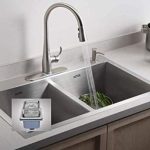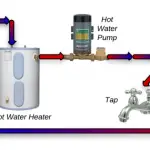If you are using a sodium-based water softener at your home, you are likely to experience a little salty taste in your potable water. It is quite common to find salty water from a water softener. If you are wondering how to fix the salty taste of water from the water softeners, you will be happy to know that there are several means to fix it.
One of the best options to fix the salty water taste can be to add potassium chloride to your water softener instead of the Sodium chloride. The potassium chloride is known to be completely free from salt and can be an excellent alternative to the sodium chloride.
What Causes Salty Water After Regeneration?
One prime cause for the salty taste of water from water softener is the lower water pressure. The water may not be able to push through the brine, and that can cause a salty taste. Issues and problems with your water softener itself may also be a common reason for the salty taste of water.

In my journey as a water technology professional, I went on to check out the possible causes, and my research yielded an insight into a few common issues within the water softener. I pinpointed a few drawbacks and component failures within the system.
Some of the issues that I came across as part of my research include
Low water pressure
A low water pressure is one of the most likely reasons that can result in a salty taste in the water coming out of the softener. If the water pressure drops below 30 PSI, it may not be flowing faster enough to get through the softener properly.
The right water pressure required for a water softener to work efficiently can be to opt for a pressure of 45 to 70 PSI. If your water pressure is lower than that needed, you may need to buy a booster pump.
A clogged injector
Check your injector valve first if you notice any salty taste in your water. I have observed that the injector holes are quite small in size and can easily get blocked. The prime ingredients that can block the injector are salt, dirt, and sediment.
It would be advisable to check and clear the holes within the injector. You can use a toothpick or a toothbrush to clean the holes inside the injector.
Drain Line Flow Control Clogged
Clogging in the drain line flow is yet another reason for the salty water taste in the water coming from the water softener. The drain flow can be easily blocked with sediment and salt. Clean it up carefully.
If you find the drain line flow worn out and damaged, replace the part. That would avoid the possibility of further salty taste.
Bad brine valve
A bad brine valve is yet another possible reason that can cause the salty taste in your water. If the brine valve is damaged, you would end up with the brine solution leaking into the resin container and end up saturating the resin beads with more salt than is actually necessary.
You can remove the drain and brine elbow to check for the dripping or running water issues, if any. If you find them faulty, replace the parts right away.
Too much water in the brine tank
Excessive water in the brine tank is yet another likely cause that can affect your water quality and taste. The brine tank water is likely to overflow when your water softener begins to malfunction. This can happen due to a variety of reasons, some of which may include clogged brine and drain lines and salt mushing at the bottom of the tank.
Key takeaway
The prime reason that can cause the salty taste in water is the low water pressure. It would be advisable to check if there are any other equipments that may be reducing the water pressure.
A few other likely reasons for the salty taste in the water can be due to the high sodium content in the water supply, interrupted brine cycle, an improper programming of the control head, and clogging in the brine line.
What Does Softened Water Taste Like?
Does softened water taste different? The taste of the softened water would largely be dependent on the incoming water. It is possible to detect a slight difference in the taste between softened and unsoftened water. It is largely dependent on your preferences.
A water softener removes the calcium and magnesium ions from the water supply. If your taste buds are quite sensitive, you will find that the salt is a little tasty. However, most people are still looking for a difference between the taste of softened and unsoftened water.
The soft water is likely to give you a slippery or silky texture to it. You may find it a little odd in the beginning, but s you go on using the water quite often, you will end up liking or getting used to the taste of soft water.
Key Takeaway
The taste of soft water is likely to be more neutral in some cases. The hard water is likely to have a distinct flavor, and the soft water comes with no flavor or taste. It may taste a little salty, and only a few of you may be able to notice the change in the flavor or taste.
How Much Salt Does a Water Softener Add?
The likely contribution of the salt to the softened water due to the salt used in the water softener can be around 7%. If you are consuming around two liters of water per day, this 7% is likely to be equivalent to about a quarter of a teaspoon.
The amount of sodium salt added to the softened water is dependent on the hardness level of the water. If the initial hardness of the water is too high, the water softener will add more water to the water. The hard water has calcium and magnesium, and the water softener will have to add more sodium particles to the water. This will increase the salt content in the water.
Key takeaway
The normal contribution of salt added by the water softener to the salt is around 7%. If your water supply is more or on the higher side, you are likely to find a higher percentage of salt in the softened water.
The table here should give you an idea of the amount of salt added to a quart of water depending on the hardness of the water. On account of my interactions with the clients, and friends, the proportion indeed works well enough.
| Initial Hardness Level (PPM) | Sodium Added (MG) per quart |
| 0-50 | 12.5-25 |
| 51-100 | 25-50 |
| 101-150 | 50-75 |
| 151-200 | 75-100 |
| 201-250 | 100-125 |
| 251-300 | 125-150 |
| 301-350 | 150-175 |
| 351-400 | 175-200 |
The above values are approximate in nature. Do note that adding too much salt can be detrimental to health. As a water treatment professional, I have always recommended my clients opt for the use of a water filter or river osmosis device to get rid of unwanted minerals.
Why Does The Water Suddenly Tastes Salty?
The water softener generally does not add more salt to the softened water in many of the cases. In fact, the salty taste can be largely due to the high chloride concentration in the water. It can also be due to the higher concentration of sulfates in the water supply.
A few of the other reasons that can result in the salty taste in the soft water suddenly can be due to industrial waste, irrigation drainage, or seawater that may enter the local reservoirs.
The salty taste in the water can also be due to a few medical reasons. Some of the medical reasons can include
Dehydration
The salty taste in the water can be due to the lower level of body fluids. If you are dehydrated, it is always advisable to consider rehydrating yourself quicker to help avoid the complications such as kidney issues, seizures, heat exhaustion, and urinary tract issues.
Dry mouth
The sudden salty taste in the mouth can also be due to dry mouth syndrome. Dry mouth can result due to several situations that include medicine side effects, aging, tobacco usage, and many other causes. Drink more water and avoid salty foods to help fix the salty taste in your mouth.
Nutritional deficiency
A lack of vital nutrients should be yet another factor cause for the sudden salty taste in water. It would be advisable to eat the foods with a lot of nutrients.
How to Fix the Salty Water Taste From a Water Softener?
If you find the water softener causing the salty water taste, there are a few select ways that can be used to fix it. Let us explore a few best options to help you fix the salty water taste from water softener.

Fix 1: Address the blockage in the injector valve
The water injector valve can get blocked due to several issues and impurities, such as dirt, solid impurities, sediments, etc. The blocked injector valve needs to be cleaned to fix the salty taste.
You can use all the blockage using a wooden stick. You should be able to handle the task yourself and will not need to have any support from any professional. Clean up the holes with the soft material and avoid using a metal object to clean the holes.
Fix 2: Check for Wrong Programming of Control Head
The programming control head is a good part of the water softener and it should have the correct information about your water hardness level. Wrong programming can result in a wrong processing of the water by the water softener.
The programming and other settings may also be affected by the other factors, such as power outages and mishandling. Check the programming head and ensure that it is appropriately configured.
Fix 3: Check the Blockage In Drain Line Flow Control
The drain line of the water softener is yet another blockage location on the water softener that can be blocked. It can get crumpled and kinked over time. Also, it is advisable to check the length of the drain.
A drain that is too long can also result in an inefficient water drainage. The drain valve can be cleaned up by checking it with your hands and removing the debris one by one.
Fix 4: Check for the Clogging of the Drain Line or Brine Line
The excess sodium content is one of the possible reasons that clog your drain line of the brine line. This can make the water get salty.
A crimped brine line can also be one of the reasons that can result in a salty water taste in your softened water. This is due to the uneven water flow and causes issues with the taste of the water. You may also need to replace a few components if required.
Fix 5: Address the interrupted brine line
The brine cycle is a stage in the water-softening process and involves the process of removing calcium and magnesium from resin beads. This stage is necessary to keep your salt levels in check in the softened water.
Check if your brine cycle is interrupted. If you are unaware of how to check it, consult a water technology professional to help address the issue.
Fix 6: Replace or repair the brine valve
The brine valve consists of several components that include brine pistons, downflow pistons, and a spacer stack, and all of them can be susceptible to damage. The faulty brine valve can result in leakage of the brine solution inside the resin container. This high concentration can result in a higher salt concentration in the drinking water.
The common reason here can be a faulty piston. It would be advisable to get it replaced soon.
The above tips and fixes should be quite effective and helpful in letting you address the issue of fixing salty water in your home.
Frequently Asked Questions (FAQs)
The Parting Thoughts
Soft water is an excellent option to drink. It can be a practical choice to help you protect your skin. It can also be a great means to save your plumbing system and even your appliances.












Add Comment